News
Strengthening protections for LGBTQ youth, the SAFETY Act passes Calif. Assembly
Measure sent to governor’s desk is ‘timely and necessary’
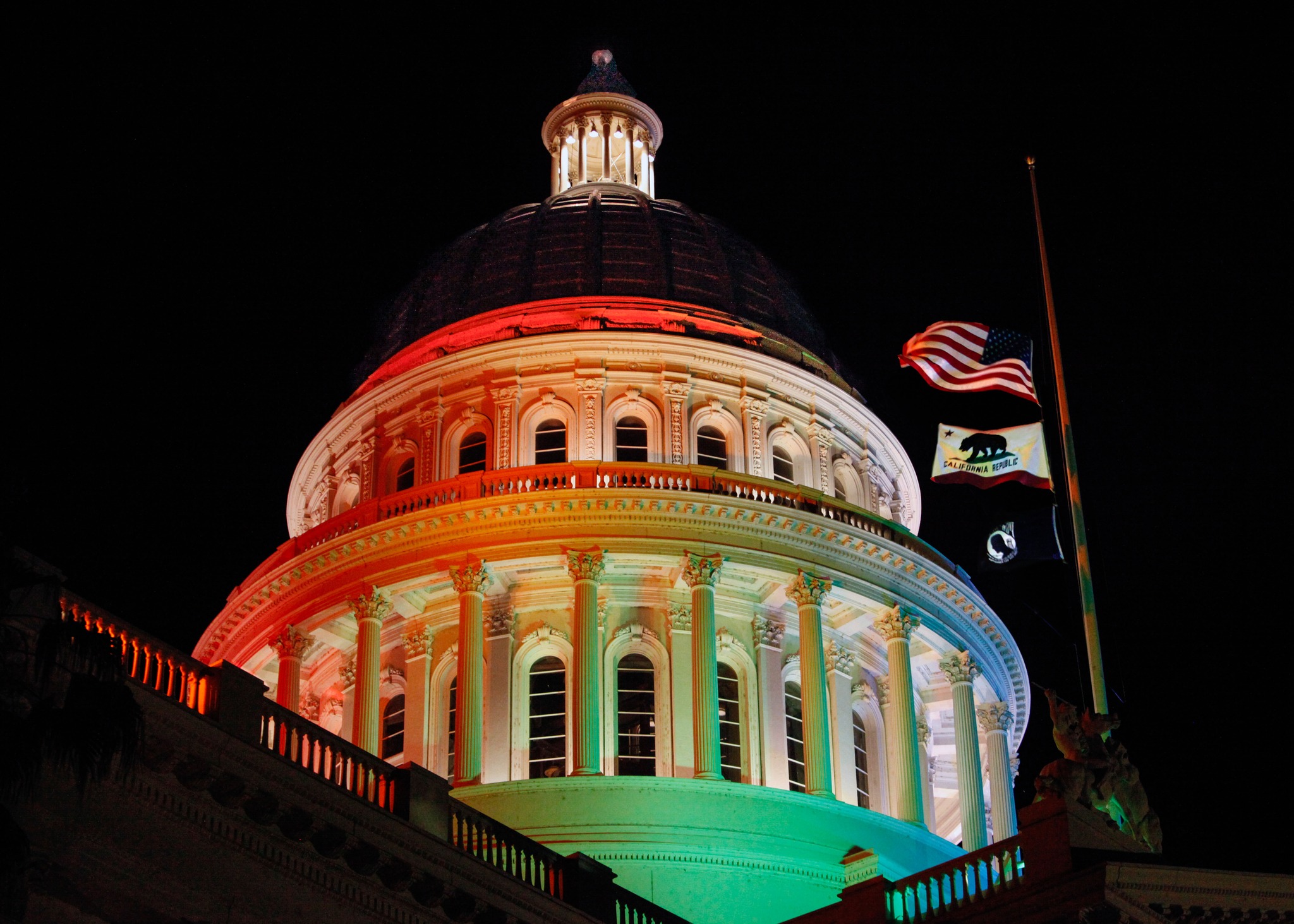
California lawmakers passed a bill Thursday aimed at protecting LGBTQ students, sending it to Gov. Gavin Newsom’s desk for final approval.
The SAFETY Act, or AB 1955, cleared the Assembly with a 60-15 vote after previously passing the Senate. The legislation strengthens protections for LGBTQ youth against forced outing policies and provides resources for families of LGBTQ students.
Proponents say the bill allows students to come out to their parents on their own terms and could protect children from potentially dangerous reactions in unsupportive home environments.
Tony Hoang, executive director of Equality California, praised the bill’s passage, calling it “timely and necessary” amid what he described as attacks on LGBTQ youth from “extremist politicians and school boards.”
“Forced outing policies remove opportunities for LGBTQ+ students to build trust and seek out resources that best fit their coming out experience,” Equality California said in a statement.
The bill faced opposition during the floor vote. Critics dispute what they call a “blanket ban” on informing parents about their children’s gender identity at school.
The legislation comes amid ongoing debate in California over school policies regarding student gender identity. In Chico, a mother sued the school district after officials did not disclose her child’s different gender identity at school. The case was dismissed but is under appeal.
If signed into law, the bill would also safeguard teachers and school staff from retaliation for fostering a supportive environment for all students.
Equality California urged Newsom to sign the bill quickly, citing its urgency in the current political climate.
Utah
Charlie Kirk shot to death at Utah university
Anti-LGBTQ figure asked about trans shooters moments earlier

Charlie Kirk, a right-wing political activist, outspoken anti-LGBTQ figure, and founder of Turning Point USA, a conservative nonprofit, was shot and killed at Utah Valley University in Orem, Utah on Wednesday.
The 31-year-old was visiting the university’s Turning Point USA chapter and speaking to a large outdoor audience when he was struck in the neck by a single bullet fired from about 200 yards away. NBC reported that no suspect is in custody, despite university police previously indicating otherwise. President Trump announced Kirk’s death on social media.
Just moments before the shooting, an audience member asked Kirk, “How many transgender Americans have been mass shooters over the last 10 years?”
“Too many,” Kirk replied—seconds before being shot. Videos of the graphic incident have since gone viral online.
Kirk had long opposed LGBTQ rights and publicly opposed same-sex marriage. He frequently cited his “Christian values” as the basis for his positions, often quoting Leviticus 20:13 (“men lying with men… abomination”) as “God’s perfect law” on sexual matters.
He was also a prominent national voice in efforts to ban transgender healthcare, saying, “Donald Trump needs to run on this issue.” Kirk further proclaimed, “Pride is a sin,” and dismissed “gay corporations that hate America.”
On his YouTube show, he declared there are “only two genders” and described “transgenderism and gender ‘fluidity’ … lies that hurt people and abuse kids.” He also warned that LGBTQ efforts would not stop at marriage equality but instead aimed to “corrupt your children,” according to Media Matters for America.
Utah Valley University, established in 1941 as Central Utah Vocational School, is the state’s largest public university, with more than 46,000 students. It is located about 40 miles south of Salt Lake City.
National
Concerns for future emerge at U.S. Conference on HIV/AIDS
‘I’m done being treated like shit in the country I grew up in’

More than 2,400 people, including public health experts, scientists, physicians, local government officials, and community activists, turned out for the 29th annual United States Conference on HIV/AIDS, which took place Sept. 4-7 at the Marriott Marquis Hotel in D.C.
Organized by the D.C.-based group NMAC, formerly known as the National Minority AIDS Council, the conference is considered the nation’s largest and most comprehensive gathering of experts involved in addressing the HIV/AIDS epidemic in the U.S.
NMAC spokesperson Pavni Guharoy said NMAC officials will be completing a final count of the conference participants based on registration numbers later this week, but she said the current estimated attendance was at least 2,500.
The conference included more than 100 workshop sessions that focused on a wide range of issues related to the status of the HIV/AIDS epidemic in the U.S., with a focus on the large and growing number of people living with HIV who are 50 years of age or older.
Information released at the conference shows that as of 2022, of the nearly 1.1 million people living with HIV in the U.S., approximately 54 percent were 50 years of age or older.
Many of the sessions addressed the needs, concerns and sometimes stigma faced by diverse communities of people living with HIV and those at risk for HIV, including African American, Latinx, and LGBTQ communities, both those who are aging as well as young adults.
The conference also included four plenary sessions in which all conference attendees listened to two-dozen prominent keynote speakers. Among them was former U.S. National Institutes of Health official Dr. Anthony Fauci, who pointed out that continuing advances in HIV research have led to effective medical intervention that changed AIDS from a once fatal illness to a condition in which people with HIV can live “a normal life span.”
Other keynote speakers included Earvin ‘Magic’ Johnson, the acclaimed basketball player who became an advocate for people with HIV after testing positive for HIV 33 years ago, and Dr. Rachel Levine, who made history by becoming the first out transgender person to be confirmed by the U.S. Senate in 2021as an appointee by then-President Joe Biden as a U.S. Assistant Secretary of Health.
Also speaking was Jeanne White-Ginder, the mother of Ryan White, who was diagnosed with AIDS in 1984 at the age of 13 from a blood transfusion. White-Ginder told conference attendees how Ryan faced discrimination when he was initially barred from going to his school in Indiana out of fear that he could transmit the virus to others at school.

In a moving presentation, she told how Ryan became one of the nation’s early advocates for people with HIV/AIDS up until the time of his death in 1990, one month before his high school graduation. She said then-U.S. Sen. Edward Kennedy (D-Mass.) invited her to come to Washington to help lobby for a bill Kennedy introduced and which Congress passed in her son’s honor called the Ryan White Comprehensive AIDS Resources Emergency (CARE) Act in August 1990.
“Now, today, thanks to your hard work and dedication, Ryan’s bill and your bill, too, provides treatment and support to more than half a million Americans in big cities, small towns and rural communities across the country,” she said. “It has dramatically reduced suffering. It has enabled people to live with HIV, to live long and healthy lives.”
But White-Ginder joined the many conference speakers, including Magic Johnson, in calling on attendees and the public to urge Congress to reject the dramatic cuts in funding for federal AIDS programs, including the Ryan White program, proposed by President Donald Trump and Republican congressional leaders for the Fiscal Year 2026 federal budget.
Among those calling on the AIDS community and allies to speak out against the proposed budget cuts were Paul Kawata, NMAC’s outgoing executive director and CEO, who is retiring Oct. 7, and Harold Phillips, the former director of the White House Office of National AIDS Policy during the Biden administration and current NMAC Deputy Director for Programs who was chosen to succeed Kawata as NMAC CEO.
NMAC officials, led by members of its board of directors, praised Kawata for his 36 years of service as NMAC’s leader and his dedication to the cause of service and support for people with HIV and AIDS.
Kawata reflected on his work at NMAC and his concerns over the current political climate in Washington in a sometimes-emotional farewell address at one of the conference’s plenary sessions on Sept. 5.
“I’ll be honest with you. After 36 years the thought of leaving all of you is much more difficult than I thought it was going to be,” he told the gathering. “You are my family. You are the people that I love,” he said.
“You taught me how to be a better version of me. And I am so extraordinarily grateful for everything that you have given me,” he continued. “And you will always be a part of my heart.”
Pointing to members of the NMAC staff, both current and former members in the audience, Kawata said, “NMAC is NMAC because of what you do every single day with your life. You fight to make a difference in the world. And I am honored and privileged to call you my friends.”
Without mentioning the Trump administration by name, Kawata had harsh words for what he said was happening now in the United States and its impact on people living with HIV.
“I’m not going to lie to you,” he said. “I’m done being treated like shit in the country that I grew up in. I’m done being told that I’m a second-class citizen because of who I love,” he continued. “It’s not my America anymore. And I’m worried for our future.”
He added, “We always talk about the pendulum of justice, about the arc of justice. And I really want you to know in this moment, as difficult and as awful and how hellacious it is, we are on the right side of history. We are the ones who will change the world.”

In his remarks at the conference’s closing Sept. 7 plenary session, Fauci said, “We’re in very difficult times. You don’t need me to tell you that. But we’ve got to continue to put the pressure on what we did in the ‘80s with the activist groups, to make sure we do end the epidemic.”
He noted that he was at his job as director of the U.S. National Institute of Allergies and Infectious Diseases in the early 1980s, when the AIDS epidemic first surfaced and the AIDS patients he and his colleagues cared for, had little chance of survival.
“Fast forward now, 44 years, extraordinary things have happened,” Fauci said. “We now have drugs that you are all very aware of that can have an individual living with HIV live essentially a normal life span in putting under the care and the availability of drugs,” he continued.
“We know what U equals U – something that we didn’t imagine some years ago. That undetectable equals untransmissible,” he said, referring to the current HIV medication that suppresses the HIV virus to an undetectable level that prevents an infected person from transmitting it to someone else.
“And right now, with these drugs that we have for the prevention of HIV we have what we actually hoped for years ago – and that is to end the HIV epidemic,” he said.
Dr. Rachel Levine, who during the Biden administration served in the dual role as Assistant Secretary of Health at the U.S. Department of Health and Human Services and as director of the U.S. Public Health Service Commissioned Corps, also spoke at the closing session of the conference.
She noted that she began her career as a pediatric physician in 1983 in New York City, at the time of the early stages of the AIDS epidemic. From that time through her years as Assistant Secretary of Health, Levine said she observed first-hand the skills and dedication of doctors, nurses, and others who cared for people with HIV/AIDS who she described as the HIV care workforce.

“The HIV care workforce since that time has been incredibly dedicated, with many people working for decades,” she said. “And working to end the HIV epidemic in the United States and around the world. We applaud you. You are in this room. We applaud you arduously for your dedication and for your passion.”
Levine also noted that the cuts in funding and large-scale federal worker layoffs brought about by the Trump administration have had a direct impact on the HIV care workforce.
“Many dedicated public health leaders, including most of the HIV and infectious disease team who I worked with in my office at HHS have had their positions eliminated,” she said. “These hard-working civil servants went to work every single day to support the health and wellbeing of all Americans, including those living with HIV.”
She added, “And we know that there are shortages in HIV care. And it is so critical at this challenging time that we support you, the HIV care workforce.”
Many conference attendees said Magic Johnson played a leading role in boosting morale and spirit at the 2025 U.S. Conference on HIV/AIDS by his inspirational speech at the Sept. 5 plenary session.
Upon receiving a prolonged, standing ovation after being introduced as the next speaker, Johnson said, “When I think about 33 years living with HIV in a moment that changed my life forever. And what a blessing to be here 33 years later to tell that story at a time when there was only one drug.”
Johnson added, “Wow, and they said it probably is a death sentence for myself, and I had to wrap my arms around making the toughest decision I probably had to make in my life, which was to retire from the NBA.”
Among other things, Johnson said his doctors told him that while he was physically capable of continuing to play basketball, the stress of an 80-game season could impact his immune system and lower his T-cell count.

With the support of family, friends, and his community, Johnson said he miraculously survived the early days without a known fully effective HIV drug. And at the request of community activists, he agreed to speak out as a well-known figure and a person with HIV to inform “my community,” especially people of color, he said, about how to live with HIV and how uninfected people can lower their risk.
“But what I do, I adhere to my doctor. I take my meds. I work out, and then I love life and myself,” he said.
In response to the challenge facing people with HIV under the current political situation, Johnson said, “We got to pull ourselves together and continue this fight, because it’s important and we got to keep this at the forefront. Now, HIV and AIDS kind of slipped back. We got to bring it back up.”
Among other things, he said the nonprofit foundation he helped to form has “given away over $15 million” in grants to HIV/AIDS organizations. “And we will continue to do that because of the work you are doing.”
He received another thunderous applause and standing ovation upon the completion of his speech.
Phillips, who will succeed Kawata as NMAC’s CEO on Oct. 7, told the Washington Blade he believes this year’s U.S. Conference on HIV/AIDS was “extraordinary” under difficult circumstances.

“I think so, because this year we did this without a lot of federal support,” he said. “And many of the attendees – the federal government, HRSA, the Ryan White program told them they couldn’t use their grant funds to attend the conference, which was a shame.”
Phillips added, “But I think with a crowd of over 2,400, some people found a way to be here regardless and thought that it was important, and the topic was important enough. And I think our listening sessions, our workshops, our plenaries hopefully gave them what they needed to continue to be activated to serve people living with HIV. “
“And also gave them a sense of hope, especially in these dark times that we can continue to work to end the HIV epidemic,” he said.
West Hollywood
Holloway Kitchen: Turning West Hollywood’s former IHOP into a hub for queer resilience and opportunity
Holloway Kitchen turns a vacant West Hollywood IHOP into a training hub for unhoused, queer, and immigrant residents, providing skills, jobs, housing support, and a voice in shaping systems that have long failed them.

Homelessness in Los Angeles is not the result of personal failure. It is a predictable outcome of systemic inequities that push people to the margins while wealth and power concentrate elsewhere. Queer and immigrant communities often carry the heaviest burden. West Hollywood, long a site of queer resistance and organizing, now faces that crisis at its doorstep.
A new initiative, Holloway Kitchen, aims to respond. Proposed by Holloway Housing, the project would transform the long-vacant IHOP at 8461 Santa Monica Boulevard into more than a restaurant. It is designed as a community hub where food becomes a vehicle for structural change—offering training, jobs, and support to unhoused residents in West Hollywood.
“Holloway Kitchen is about dignity and empowerment,” said Jerry Soper III, founder of the project. “We are not just opening a restaurant; we’re creating pathways for people to build stability while being part of a community.”
The project is intended to work with residents of the nearby Holloway Interim Housing Program, managed by Ascencia, providing culinary and hospitality training through a proposed 12-week program. Graduates could secure jobs at Holloway Kitchen itself or with local partners such as SUR Restaurant, The Abbey Food & Bar, Mother Wolf, and the Hollywood Food Coalition.
Central to the vision is a commitment to those who face the steepest barriers. “LGBTQ+ youth face a 120% higher risk of homelessness,” Soper explained. “In Los Angeles, transgender individuals make up a significant portion of unsheltered populations. Holloway Kitchen aims to address these barriers with tailored support, flexible schedules for transition-related needs, and advocacy for queer youth facing housing discrimination.”
The restaurant itself would embody that same commitment to safety and affirmation. Plans include gender-neutral restrooms, a zero-tolerance harassment policy, and comprehensive LGBTQ+ sensitivity training for staff, in partnership with The Trevor Project and the Los Angeles LGBT Center. “We want every person who walks into Holloway Kitchen—whether as a trainee, employee, or customer—to feel affirmed and welcome,” Soper said.
Equally important, unhoused people will have a voice in shaping the project. Soper has convened an advisory board of Holloway House residents and alumni, including queer youth, immigrants, and trans women, to guide decisions on training, housing partnerships, and workplace culture.
Holloway Kitchen also seeks to honor West Hollywood’s legacy of queer organizing. “This project is inspired by the AIDS crisis response, when the community rallied to provide care, advocacy, and support,” Soper explained. Planned educational displays and events will highlight queer pioneers and the city’s history of resilience, blending historical reverence with forward-looking innovation.
The project is currently seeking $825,000–$1,075,000 in startup funding for renovations, staffing, and equipment, with a goal of opening in 2026. While the vision is ambitious, the City of West Hollywood underscored that it remains in the proposal stage. “The proposer has not, to date, been connected to the City, its service providers, or the property owner regarding this idea, and establishing these connections is a necessary prerequisite to consideration,” said Joshua Schare, City spokesperson. “We welcome the proposer to reach out to the City’s Human Services Division to discuss it further.”
Soper envisions the impact for participants: “In a year, a young queer person who comes to us with no job and no home could be thriving with stable employment, safe housing, and a support network. They would feel empowered to give back, becoming part of West Hollywood’s legacy of resilience.”
If successful, Holloway Kitchen could become a replicable model for addressing homelessness at the intersections of queerness, poverty, and immigration—providing a community-driven path toward opportunity where systems have historically failed. For now, it stands as a proposed initiative that seeks to reclaim power, restore dignity, and prove that survival is possible through solidarity and hope.
National
House GOP seeks to cut all U.S. HIV prevention programs in 2026
‘A disastrous bill that will reignite HIV in the United States’

The Republican-controlled Appropriations Committee of the U.S. House of Representatives has released its Fiscal Year 2026 funding bill that calls for cutting funds for domestic HIV prevention, treatment, and care programs by at least $1.7 billion, which is an amount significantly greater than the AIDS budget cuts proposed by President Donald Trump.
Among other things, the bill, if passed by the full Congress, would eliminate federal funding for all HIV prevention programs in the U.S. as well as eliminate the Ending the HIV Epidemic Initiative program that Trump persuaded Congress to pass during his first term as president.
“This is not a bill for making America healthy again, but a disastrous bill that will reignite HIV in the United States,” said Carl Schmidt, executive director of the D.C. based HIV + Hepatitis Policy Institute, in a Sept. 1 statement.
“We urge Congress to reject these reckless cuts,” Schmidt says in the statement. “Eliminating all HIV prevention means the end of state and local testing and surveillance programs, educational programs, and linkage to lifesaving care and treatment, along with PrEP,” the statement continues. “It will translate into an increased number of new HIV infections, which will be costlier to treat in the long run.”
It adds, “At a time when we have the tools to prevent HIV, including new long-acting forms of PrEP, we must not abandon the bipartisan progress our nation has made in combating HIV.”
The proposed bill by the House Appropriations Committee, which has not yet taken a full committee vote on the bill, would also cut the Ryan White HIV/AIDS Care and Treatment Program by $525 million or 20 percent.
The bill would eliminate the entire $1 billion in prevention funding at the U.S. Centers for Disease Control and Prevention, including $220 million allocated to President Trump’s Ending the HIV Epidemic (EHE) initiative.
Schmidt points out that nearly 90 percent of this funding “flows to state and local health departments, including those in the South that do not have dedicated state funding and carry over half of HIV cases in the country.”
The House committee proposal supports the president’s budget proposal to eliminate $43 million in dedicated funding for hepatitis prevention at the CDC and instead proposes a $353 million block grant to states that would also include STD and tuberculosis prevention. This is $53 million more than the president proposed but still represents a combined cut of $24 million, Schmidt says in his statement.
“Instead of decreasing and diluting funding for hepatitis, if the country is serious about addressing chronic health conditions,” added Schmid, “we should be increasing funding so that people with hepatitis can be identified through testing and linked to treatment, and in the case of hepatitis C, a cure.”
The proposal by the House Appropriations Committees follows the U.S. Senate’s release earlier this year of a bipartisan FY 2026 budget bill that would maintain current funding for domestic HIV programs. If the House committee passes its proposed budget bill the budget provisions would have to be reconciled with the Senate version, and a reconciled version must then be passed by the full Congress.
National
Doctor who led mpox response resigns from CDC, slams administration
‘Unskilled manipulation of data to achieve a political end’

Dr. Demetre Daskalakis, director of the National Center for Immunization and Respiratory Diseases at the Centers of Disease Control and Prevention, resigned from his position on Wednesday in a scathing social media post.
“I am unable to serve in an environment that treats CDC as a tool to generate policies and materials that do not reflect scientific reality and are designed to hurt rather than to improve the public’s health.” Daskalakis wrote in a resignation letter he posted to X. “Having worked in local and national public health for years, I have never experienced such radical non-transparency, nor have I seen such unskilled manipulation of data to achieve a political end rather than the good of the American people.”
Daskalakis, who’s gay, was among three senior officials to resign following President Trump’s firing of CDC Director Susan Monarez. She is fighting her dismissal.
In 2022, Daskalakis drew praise from the LGBTQ community while serving as White House National Monkeypox Response Deputy Coordinator. Daskalakis previously served as medical director for the New York-headquartered Mount Sinai Health System and then was made deputy commissioner for the Division of Disease Control at the New York City Department of Health and Mental Hygiene. In late 2020, as the U.S. saw thousands of new covid fatalities each day, Daskalakis joined the Centers for Disease Control and Prevention’s Division of HIV/AIDS Prevention.
In an exclusive interview with the Blade during the mpox crisis in 2022, he warned of the dangers of homophobic stigma.
“Stigma is stigma, and homophobia is homophobia,” Daskalakis said, and while these problems are older, more intractable, and broader in scope than public health messaging around MPV, it is important to not “attach an infection to an identity.”
“Stigmatizing a disease and creating stigma really creates rabbit holes that take people away from [figuring out] how to respond to an infectious disease — and the way that you respond to infectious diseases, the focus on community, the focus on knowledge, and the focus on data, which should act as a guidance” in getting messages to people, whether through online social platforms or other channels, he said.
Dr. Monarez, who only served in her job for one month, said she refused “to rubber-stamp unscientific, reckless directives” and accused HHS Secretary Robert F. Kennedy Jr. of “weaponizing public health.”
Dr. Monarez reportedly clashed with Kennedy over vaccines. The government announced earlier this week that healthy adults would not be eligible for a new COVID booster and instead only those 65 and older, children, and those with underlying medical conditions would be eligible for the new vaccine.
Palm Springs
Be Heard: Palm Springs Pride moves forward in 2025, celebrating resilience and resistance
Despite a $325K sponsorship shortfall, Palm Springs Pride presses on, celebrating LGBTQ+ resilience, community power, and the enduring spirit of resistance.

Despite facing a $325,000 shortfall in sponsorship funding, Greater Palm Springs Pride is pressing forward with its annual four-day celebration, which draws more than 200,000 attendees and generates millions in local economic impact.
“In our specific case, 60% of our shortfall is from one sponsor in Florida where the governor has directed a pullback from supporting DEI or related programs. The other 40% is a sign of economic times,” said Ron deHarte, President of Palm Springs Pride. “Partners who have and continue to support Palm Springs Pride are experiencing tighter budgets… we are confident good partners will continue their investment in our programming.”
The funding gap underscores how critical LGBTQ+ organizations are to their communities. DeHarte noted that these groups provide services ranging from crisis intervention for homeless youth to HIV/AIDS prevention, legal aid, and safe spaces. “When funding is cut or becomes unreliable, these vital services are put at risk. This not only undermines the organizations themselves but also directly impacts the well-being and safety of the individuals they serve. This financial pressure can be seen as a modern tactic of marginalization,” he said.
But this challenge is part of a much longer history of resilience for the LGBTQ+ community. “The history of Pride is fundamentally a story of resistance. From the Stonewall Uprising’s response to police harassment and brutality, the LGBTQ+ community has always had to fight for its right to exist openly and without fear… the collective pushback against legal, social, and political forces that have sought to push LGBTQ+ people to the margins defines what the LGBTQ+ movement has represented for the last 50 years,” deHarte said.
For deHarte, the shortfall is also a testament to the LGBTQ+ community’s ingenuity and self-reliance. “We are not victims. The LGBTQ+ community has a long history of fighting for its rights… The decision to proceed with Palm Springs Pride, even with fewer resources, is a testament to this spirit of self-reliance and strength. We have fought for everything we have. The rights and freedoms celebrated at Pride were not given freely; they were earned through decades of activism, advocacy, and sacrifice,” he explained.
“We do what needs to be done with the resources available. This year’s event will highlight the ingenuity and resourcefulness of the LGBTQ+ community. When faced with a lack of corporate sponsorships, grassroots support and community donations will fill the void. This underscores the idea that the community’s power comes from within, not from external validation or funding. We do more with less,” deHarte said.
Even with fewer resources, organizers say the festival will remain bold, inclusive, and unapologetically political. “It is vital that we stand together and show the world that our community is strong and our fight for equality continues. This year, more than ever, Palm Springs Pride will be a vibrant and political statement and a call to action that will not be quieted,” he added.
From its roots in grassroots protest to today’s massive celebration, Palm Springs Pride demonstrates the power of community, the resilience of a movement, and the enduring spirit of resistance — proving that Pride is not just a party, but a declaration: the fight for equality continues, and the LGBTQ+ community will not be silenced.
Those who want to support the festival can make a contribution online or participate in events like the Equality Walk, though attendance remains free to all.
You’ve linked the shortfall to the current political climate. When we look at the far-right media pipeline, it feels like they’re creating a lot of noise — but does that reflect reality on the ground?
In our specific case, and we point out every Pride organization is unique, 60% of our shortfall is from one sponsor in Florida where the governor has directed a pullback from supporting DEI or related programs. The other 40% is a sign of economic times. Partners who have and continue to support Palm Springs Pride are experiencing tighter budgets. They have been supportive in the past, are continuing to be supportive today. We are confident good partners will continue their investment in our programming.
Corporations seem to react quickly to that noise, often pulling back support out of fear. Do you see that as a reflection of real public opinion, or more about how power operates in boardrooms and newsrooms?
We have heard of this happening with some very large Pride organizations across the country. But when you step back and look at the 450-500 Pride events in the United States, a very small percentage of those events have experienced the corporate retreat you mention.
Pride was born as resistance to systems of power that wanted us silent. How do you see this year’s funding shortfall fitting into that longer history of LGBTQ+ people being pushed to the margins? Has the resistance ever changed?
The history of Pride is fundamentally a story of resistance. From the Stonewall Uprising’s response to police harassment and brutality, the LGBTQ+ community has always had to fight for its right to exist openly and without fear. The root of the struggle has been about individual rights; however, the collective pushback against legal, social, and political forces that have sought to push LGBTQ+ people to the margins defines what the LGBTQ+ movement has represented for the last 50 years.
In this context, the recent funding shortfall for LGBTQ+ organizations is a deeply concerning development that fits into this long history of marginalization. It is a modern form of the same pressure that has historically been used to silence and undermine the community.
The struggle for equality continues. Funding shortfalls for LGBTQ+ organizations represents a new front in this ongoing battle. These organizations are critical, providing a range of essential services for crisis intervention for homeless youth, healthcare access and HIV/AIDS prevention, legal aid for discrimination cases and community centers that provide safe spaces. When funding is cut or becomes unreliable, these vital services are put at risk. This not only undermines the organizations themselves but also directly impacts the well-being and safety of the individuals they serve. This financial pressure can be seen as a modern tactic of marginalization, as it seeks to weaken the infrastructure that the LGBTQ+ community relies on to advocate for its rights and support its members.
The funding shortfall is not just a financial issue; it’s an issue of social justice. It highlights the continued need for vigilance and support to ensure that the progress made by the LGBTQ+ community is not rolled back.
Corporate sponsorship often comes with strings attached and can vanish in the face of political pressure. What does it take to build support that is unshakeable, rooted in actual community power rather than optics?
What sponsorship support comes with no strings attached or no risk of future investment? Grants have deliverables and restrictions, city government funding is dependent on political support, businesses want logo exposure / tickets/ recognition, and now federal grants require removal of any transgender language. One would think individuals would freely donate to their local Pride but many view Pride as a party. It would be great for individual donors to replace the funds currently provided by large money sponsors. While many Pride events are free to attend, implementing small fees for certain aspects can generate significant revenue. Tickets for specific concerts, reserved seating for the parade, or fundraisers throughout the year are also ways to shift the funding model. These are all opportunities. We need to do a better job letting the community know how they can support.
Is it fair to say that relying on corporations has sometimes weakened Pride’s political edge? How do you balance funding needs with staying true to a movement built on resistance?
In our case we have never tempered the political nature of Pride in Palm Springs. However, we have experienced parade participants pulling out because they feel the parade is too political.
What role do you see for small businesses, local organizers, and everyday community members in sustaining Pride, especially when big sponsors pull out?
For free Pride events like Palm Springs Pride, attendees can help by donating $10 bucks (or more) online in place of buying a ticket. Many small businesses who are able already support Pride. However, there are many others who benefit from the economic impact a Pride event has in the community who choose not to provide support. Our message is that we welcome everyone, we are a free event and donations are appreciated to cover expenses.
Systems of power that target queer people are also targeting immigrants, BIPOC communities, and other marginalized groups. How do you see Pride standing in solidarity across those struggles?
We are immigrants. We are the BIPOC community. While Palm Springs is widely known as a welcoming and inclusive city for the LGBTQ+ community, groups within the community face additional layers of marginalization. These groups often experience unique challenges due to the intersection of their LGBTQ+ identity with other identities, such as race, age, and disability. We are one and must ensure TGI individuals, LGBTQ+ people of color, youth, older adults and individuals with disabilities are at the table.
Are there lessons from mutual aid and grassroots organizing that could reshape how Pride operates — making it more of a real support network, not just a festival?
Yes, the origin of Pride is in grassroots organizing and protest. While the modern landscape includes celebratory elements and corporate involvement, look behind the curtain, and one will see its core purpose remains a powerful blend of community building, activism, and providing a crucial support network for LGBTQ+ people. That’s grassroots in 2025. In Palm Springs, it is, and always has been, more than just a party. Pride is fundamentally a real and vital support network for the LGBTQ+ community.
At a grassroots level, Pride provides a space for LGBTQ+ individuals to be their authentic selves without fear of shame or stigma. This visibility is powerful, especially for those who may feel isolated in their daily lives. Pride events, and the organizations behind them, connect people with a “chosen family” and a sense of belonging. Pride continues to be a call to action. It raises awareness about ongoing struggles for equality and rights, and it is a powerful opportunity for protest and political mobilization.
Looking back at the history of Pride as a movement born from resistance, does this funding crisis feel like an opportunity to recenter the movement on community accountability, activism, and care networks rather than corporate sponsorship?
This is certainly a time to ensure our platform reignites the Pride experience to demand rights, protest injustice, and raise awareness about ongoing struggles of the community. The current funding crisis, while difficult, presents a chance to fortify the movement from the ground up, ensuring it remains a powerful force for advocacy and community care, rather than a perceived corporate-sponsored spectacle. It is vital that we stand together and show the world that our community is strong and our fight for equality continues. This year, more than ever, Palm Springs Pride will be a vibrant and political statement and a call to action that will not be quieted.
What would you say to those watching from outside the LGBTQ+ community? What message does Palm Springs Pride send by moving forward this year despite these setbacks?
To those watching from outside the LGBTQ+ community, Palm Springs Pride sends a powerful and unwavering message. It is a message of resilience, determination, and a refusal to be silenced. By moving forward this year despite recent funding shortfall due to a challenging political climate, Palm Springs Pride is showing our commitment is not conditional on easy circumstances. We are demonstrating that Pride is more than a party; it is a fundamental act of visible existence, a celebration of hard-won rights, and a continued protest against injustice.
We are not victims. The LGBTQ+ community has a long history of fighting for its rights. From daily struggles for equality, the community has always had to create our own path forward. The decision to proceed with Palm Springs Pride, even with fewer resources, is a testament to this spirit of self-reliance and strength. We have fought for everything we have. The rights and freedoms celebrated at Pride were not given freely; they were earned through decades of activism, advocacy, and sacrifice. This year’s events serve as a reminder of this ongoing struggle and honors the pioneers who paved the way.
We do what needs to be done with the resources available. This year’s event will highlight the ingenuity and resourcefulness of the LGBTQ+ community. When faced with a lack of corporate sponsorships, grassroots support and community donations will fill the void. This underscores the idea that the community’s power comes from within, not from external validation or funding. We do more with less. The ability to adapt and thrive in the face of adversity is a defining characteristic of the LGBTQ+ community. Palm Springs Pride’s continued existence despite a budget reduction shows that the core message and purpose of the event are not dependent on a lavish production. The focus remains on community, activism, and a powerful, visible presence.
Palm Springs Pride Celebration 2025 / Thur Nov 6 through Sun Nov 9 FREE ADMISSION
National
CVS Health withholds coverage for new HIV prevention drug
AIDS activists criticize delay for acclaimed twice-yearly PrEP medication

CVS Health, one of the nation’s largest pharmacy benefit manager companies that play a lead role in deciding which drugs are covered by health insurance plans, has initially decided not to approve coverage for the new HIV prevention drug Yeztugo
Developed and manufactured by the pharmaceutical company Gilead Sciences, Yeztugo was approved for use in June of this year by the U.S. Food and Drug Administration as an HIV prevention or PrEP medication that needs to be taken just twice a year by injection.
HIV prevention advocates hailed the new drug as a major breakthrough in the years long effort to curtail and end the HIV/AIDS epidemic by enabling far more people at risk for HIV infection to adhere to a prevention drug regimen that needed to be taken once every six months rather than daily pills or through bi-monthly injections.
But the same advocates warned that the benefits of Yeztugo, which tests showed is greater than 99 percent effective in preventing HIV infection, could not be realized if the cost of the drug is not covered by health insurance plans or other coverage programs.
At the time the FDA approved its drug, Gilead Sciences announced that the yearly retail price for Yeztugo without insurance coverage would be $26,218.
According to reports by Reuters and Bloomberg news publications, a CVS Health spokesperson disclosed on Aug. 21 that the company “for now” would not add Yeztugo to its commercial coverage plans.
“As is typical with new-to-market products, we undergo a careful review of clinical, financial, and regulatory considerations,” Bloomberg News quoted CVS spokesperson David Whitrap as saying. Bloomberg reports that Whitman added that Yeztugo hasn’t been added to CVS Caremark’s commercial drug plans or U.S. Affordable Care Act plans.
“The entire world is excited by this drug and its potential contribution to preventing and eventually ending HIV,” said Carl Schmid, executive director of the D.C.-based HIV + Hepatitis Policy Institute. “However, a drug will only work if people can access it and right now CVS Health, which owns the largest pharmacy benefit manager in the country, is shamefully blocking people from taking it, unlike other payers,” Schmid said in a statement.
“We urge CVS, which has been committed to ending HIV in the past, to reconsider their decision immediately,” Schmid said. “Additionally, we call on federal and state regulators to ensure that plans are in compliance with the federal government’s PrEP coverage guidance and the many state laws that require coverage of all PrEP drugs.”
Gilead Sciences, meanwhile, has said it is “extremely pleased” with the progress it is making with other health insurance companies and “payers” to arrange for coverage of Yeztugo, according to Reuters. “[T]he company said it is on track to secure 75 percent of U.S. insurer coverage of Yeztugo by year-end, and 90 percent coverage by June 2026,” Reuters reports.
State Department
State Department’s 2024 human rights report could jeopardize LGBTQ+ asylum cases
‘Targeted and malicious act’ will ‘directly endanger lives’
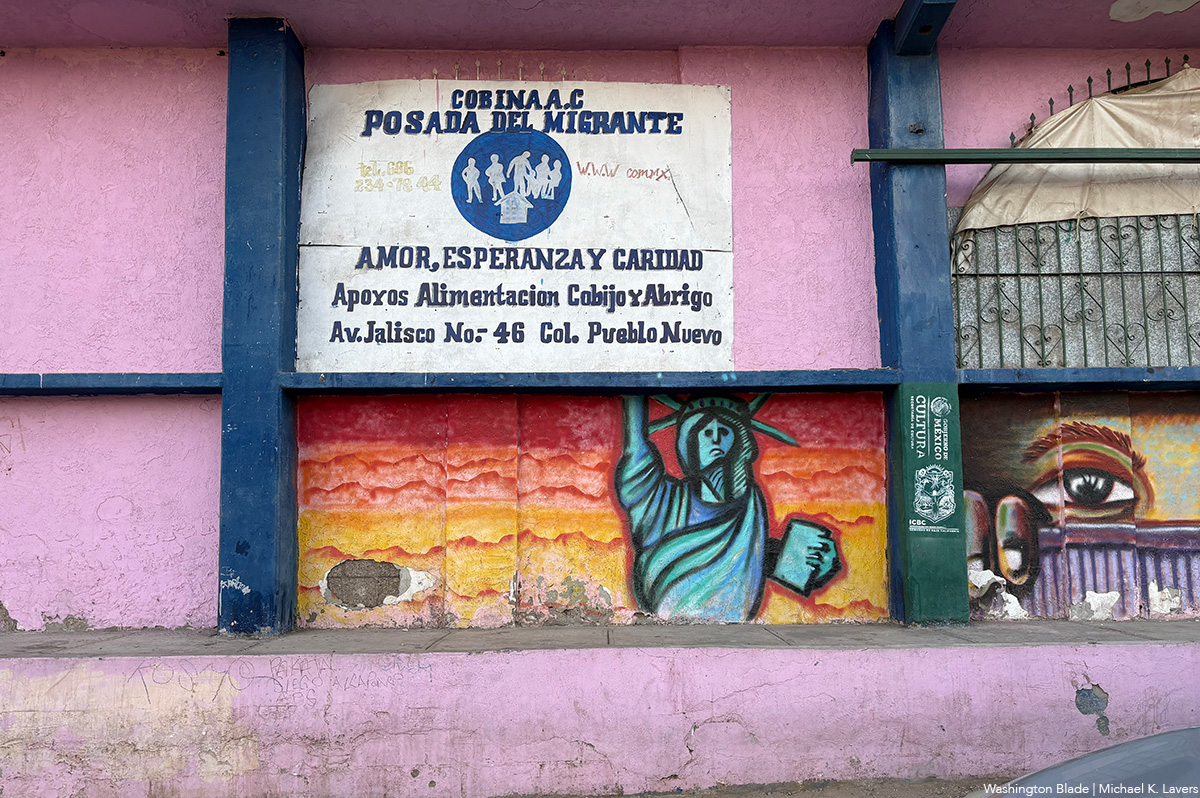
Advocacy groups say the State Department’s 2024 human rights report that “erased” LGBTQ+ people will jeopardize the cases of those who are seeking asylum in the U.S.
Immigration Equality notes the report “serve as key evidence for asylum seekers, attorneys, judges, and advocates who rely on them to assess human rights conditions and protection claims worldwide.”
The 2024 report the State Department released on Aug. 12 did not include LGBTQ+-specific references. Immigration Equality Director of Law and Policy Bridget Crawford in a statement said country-specific reports within the larger report “should be accurate, fact-based, and reflect the lived reality of LGBTQ people — not ignore and actively hide it.”
“When adjudicators see less information in these reports than in prior years, they may wrongly assume conditions have improved,” said Crawford. “In truth, the absence of reporting is a purely political move, not based in fact or reality.”
Organization for Refuge, Asylum and Migration Executive Director Steve Roth in a statement condemned the Trump-Vance administration’s “deliberate erasure of LGBTIQ communities from the 2024 human rights report — an unprecedented move that violates international standards.”
“This is a targeted and malicious act that will directly endanger lives,” he said.
Roth, like Immigration Equality, noted courts “around the world rely on these reports to evaluate asylum claims.”
“Stripping out documentation of LGBTIQ persecution removes a vital tool in assessing claims for protection, jeopardizing the ability of LGBTIQ asylum seekers to access safety,” said Roth.
Congress requires the State Department to release a human rights report each year.
The State Department usually releases them in the spring, as opposed to August. Then-State Department spokesperson Tammy Bruce, who president Donald Trump has nominated to become deputy representative at the U.N., during her last press briefing on Aug. 12 defended the delay and the report itself.
“We weren’t going to release something compiled and written by the previous administration,” said Bruce. “It needed to change based on the point of view and the vision of the Trump administration, and so those changes were made.”
Asylum courts ‘will have less credible data to rely on’
Jessica Stern, the former special U.S. envoy for the promotion of LGBTQ+ and intersex rights under the Biden-Harris administration, co-founded the Alliance for Diplomacy and Justice with several other former State Department officials.
The Alliance for Diplomacy and Justice in response to the report said the U.S. has “betrayed the trust of human rights defenders who risked their safety to share the truth” and added “some (of them) are now less safe.”
“Asylum courts in the U.S. and globally will have less credible data to rely on,” said the group.
Human Rights Watch echoed the Alliance for Diplomacy and Justice.
“The human rights report has been used in U.S. asylum court cases to show that an asylum seeker could not be returned to a country where similarly situated people were being persecuted,” said Human Rights Watch in response to the 2024 report. “That essential resource for keeping people safe is not only no longer reliable or helpful, but in some cases could put people at risk by denying abuses in places where the United States or other countries intend to deport asylum seekers and immigrants.”

En el corazón de Medellín hay una red que late con fuerza propia. No aparece en los grandes titulares, pero su presencia se percibe en el sonido de un tambor que marca el ritmo de un ensayo, en las manos que se manchan de colores para pintar un mural, en el aire tibio que entra por las ventanas abiertas y se mezcla con el eco de una risa, en los abrazos que cierran una jornada. Es la Red Popular Trans, una plataforma comunitaria que ha hecho del arte, la naturaleza, las espiritualidades y la organización social una herramienta de vida para cientos de personas trans, no binaries y cuir, un lugar donde la creatividad fluye como el agua, se expande como el viento y se enraíza como un árbol que crece en suelo fértil.
Allí, los sueños se tejen en colectivo y las puertas que antes parecían cerradas se abren para dejar pasar la luz. De ese trabajo nació el Festival Interdisciplinar de Artes Trans – Travar las Artes, organizado junto a la colectiva Pajarapintadanza y fundado con el impulso y liderazgo de Ale Álvarez, quien fue una de sus creadoras y principal representante durante los primeros cuatro años. Este festival no es un evento para la foto, es el primer festival de arte trans en Colombia dirigido por personas trans y para personas trans, un hecho histórico que ha marcado un antes y un después en la cultura del país.
No es un simple espacio de exhibición: es un laboratorio vivo de resistencia y cuidado donde la danza, el teatro, la música, la poesía y las artes visuales dialogan con la tierra, el cuerpo y la voz, devolviéndoles su poder y transformándolos en acto político y en celebración de la vida. Travar las Artes ha demostrado que la cultura también puede ser una trinchera de libertad, y que es posible resignificar tradiciones para abrir nuevos caminos. Basta recordar la reinterpretación del bullerengue, una danza tradicional colombiana, llevada a escena desde una mirada queer y desafiante. Poner a una travesti a bailar bullerengue no fue un simple acto estético, sino un gesto político que desafió estructuras hegemónicas y abrió posibilidades de representación que antes parecían impensables.
En este espacio no hay protagonistas únicos. Cada historia es un cauce que alimenta un mismo río: la joven que encontró en la danza un lenguaje para hablar de su identidad sin miedo, el actor que convirtió su transición en una obra de teatro que recorre barrios y escuelas, la cantante que lleva su voz a escenarios comunitarios porque sabe que allí también se construye país. Entre esas historias, una brilla con especial fuerza: la de Ale.
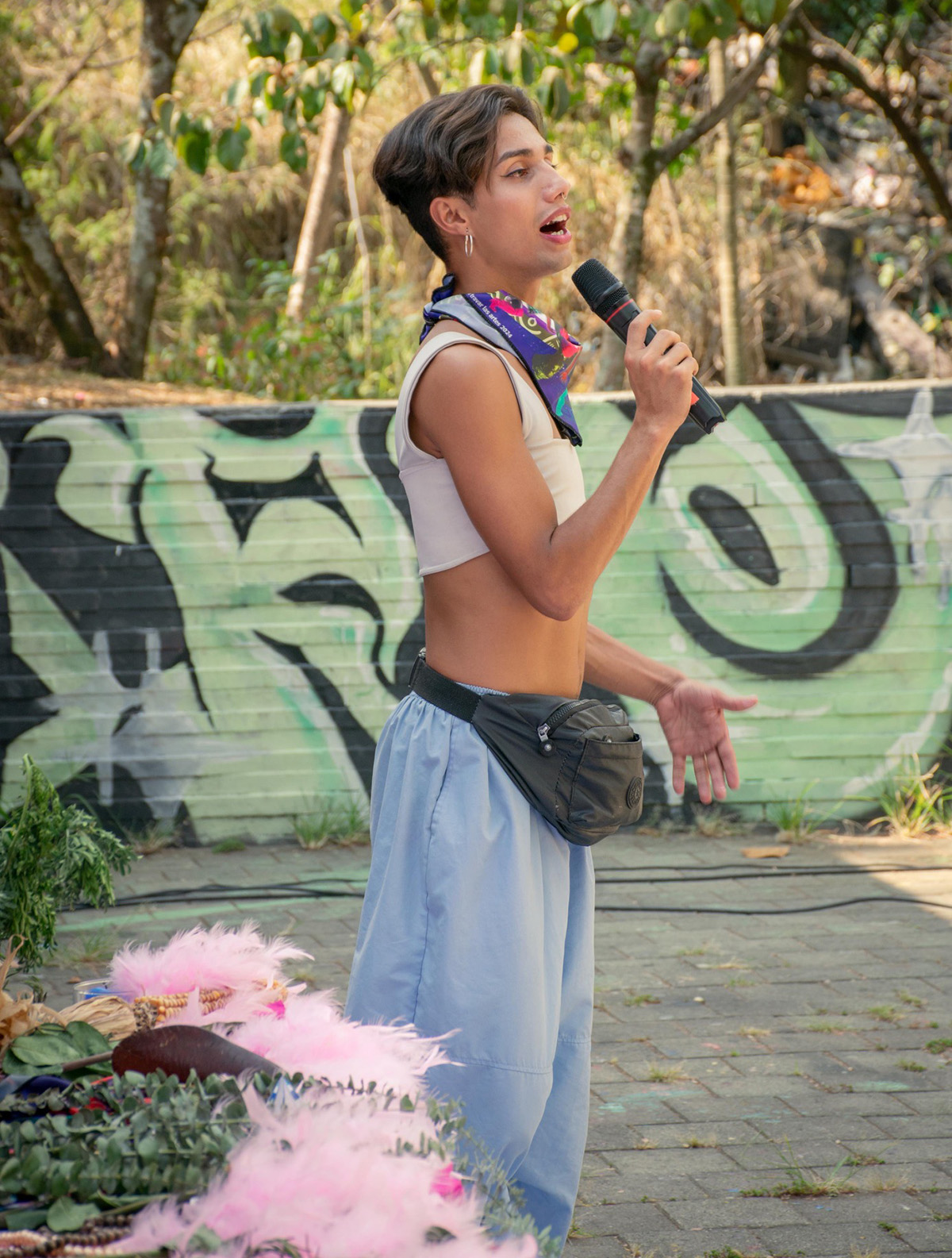
Ale llegó a la Red Popular Trans buscando un lugar seguro donde pudiera ser sin explicaciones ni condiciones. Lo encontró, y encontró también un espejo en el arte, una forma de reconocerse. Lo que empezó como curiosidad por la danza se volvió vocación y raíz. Hoy es licenciada en Danza, graduada con honores, y ha regresado a los mismos espacios que la vieron crecer para guiar a otres que, como ella, buscan un camino. En cada taller que facilita, Ale recuerda que antes de ser profesional fue una persona que necesitaba escuchar: “Aquí eres bienvenide”.
Esa frase resume la esencia de lo que aquí ocurre. La Red Popular Trans no solo impulsa el festival: organiza talleres permanentes, acompaña procesos de salud y bienestar, conecta artistas con oportunidades y teje redes de apoyo que se sostienen incluso fuera del escenario. Pajarapintadanza ha puesto el cuerpo, el movimiento y el espíritu al servicio de la pedagogía queer y decolonial, demostrando que el arte puede sanar, movilizar y transformar.
En estas redes, cada logro individual es una victoria colectiva. Cuando une bailarín trans pisa un escenario, cuando une pintore no binarie exhibe su obra, cuando une poeta cuir recita frente a su comunidad, toda la red respira con orgullo. El arte que nace aquí no es lujo, es necesidad; no solo inspira, sino que salva. Es viento que acaricia, raíz que sostiene, agua que fluye y fuego que enciende. El trabajo comunitario, constante y apasionado, convierte historias marcadas por el dolor en relatos de resiliencia y esperanza. Ale, la Red Popular Trans, Pajarapintadanza y Travar las Artes son prueba viva de ello, recordándonos que mientras haya cuerpos que bailen, voces que se alcen y manos que creen, siempre habrá un lugar para empezar de nuevo, y a veces, sin darnos cuenta, ese lugar se convierte en hogar.
National
After targeting youth, state lawmakers now going after the rights of LGBTQ adults
Legislators are also teeing up challenges to same-sex marriage
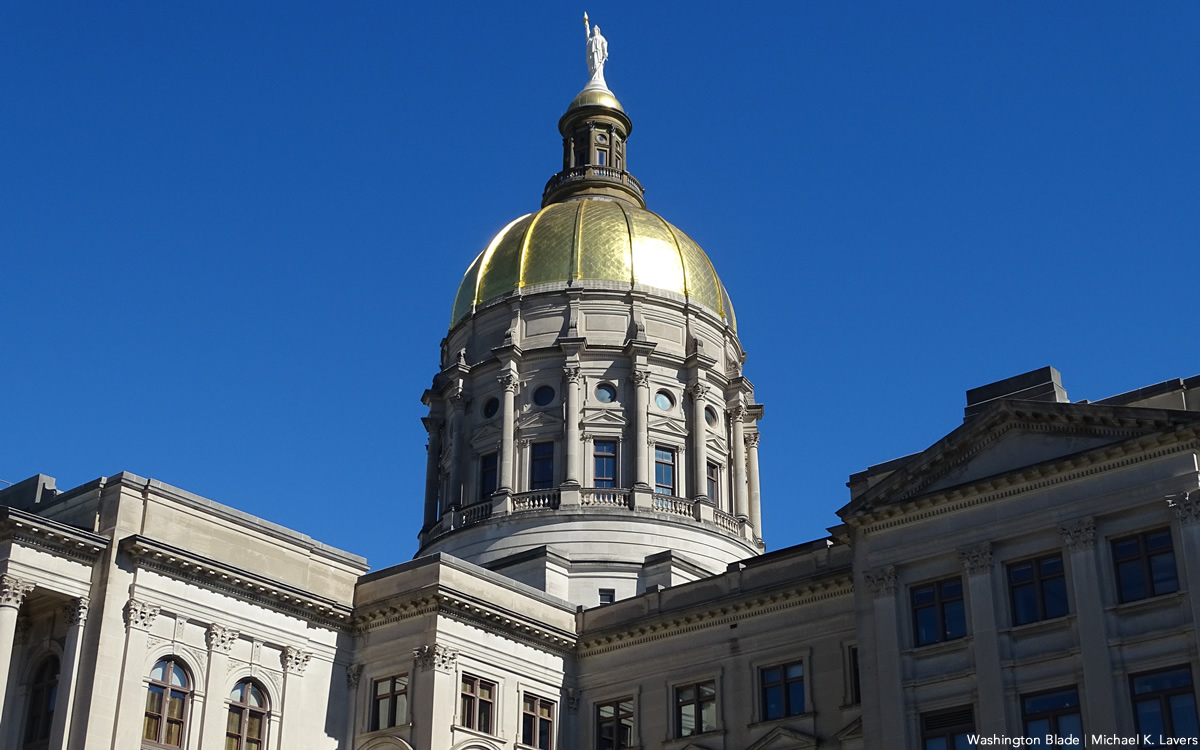
The proliferation of anti-LGBTQ bills proposed by state legislatures across the country, which ticked up dramatically in 2021 and has since increased year-over-year, looks different in 2025.
Efforts that once focused on school sports and pediatric gender care have now broadened, as many advocates warned they would, to target adult life and the legal scaffolding of hard-won freedoms like same-sex marriage.
LGBTQ issues remain fraught political battlegrounds, but the fight has shifted to driver’s licenses, hospital policies, state-worker speech rules, and even marriage licenses — exposing these communities to greater risk of civil-rights violations.
This shift comes at a moment when legal avenues for challenging discrimination by state governments or the Trump-Vance administration have narrowed significantly, even as rhetorical and political attacks intensify.
The new types of bills
By the numbers, this year is shaping up to be the worst in recent memory. The ACLU tracked 520 anti-LGBTQ bills in 2023, 533 in 2024, and by February the organization had already logged 339, an accelerated pace for 2025.
Predictably, these legislative efforts are clustered in conservative places like Texas, where state lawmakers teed up 32 anti-trans bills on the first day of pre-filing for 2025, as GLAAD noted.
At the same time, however, the group reports that the year kicked off with similar activity in far bluer statehouses located in places like Massachusetts, Colorado, and New York.
The new crop of bills share some distinguishing features. For instance, Alabama, Arizona, Georgia, and Illinois are considering (or have enacted, in Alabama’s case) proposals to adopt restrictive definitions of sex and gender.
Not only does the establishment of a legal definition for gender based on a fixed binary that must be determined by one’s sex at birth exclude the recognition of people who are trans or have other gender diverse identities, but it also carries significant downstream impacts.
President Donald Trump has already demonstrated how this can work. Issued on the first day of his second term, his Executive Order 14168 recast “sex” across all federal policy as a fixed category that is limited to “male” or “female,” defined at “conception,” and unchangeable.
Pursuant to the order, the administration mandated that agencies replace all mention of “gender” with “sex,” strip gender self-identification options from passports, and halt funding for anything deemed “gender ideology,” including gender‑affirming care.
With respect to restrictions on gender markers on passports and official documents, the consequences for Americans who are not cisgender are far-reaching, touching areas of their lives from housing to employment and travel.
Georgia, meanwhile, previewed how conservative lawmakers can restrict guideline-directed best practices medical interventions for not just transgender youth, but adults as well, with a bill introduced this year that would bar coverage by state employees’ health benefits plans.
Georgia has also enacted a law prohibiting all gender-affirming care (hormones, surgeries, and even personal funding of such care) for incarcerated individuals in state prisons, which came after Trump’s executive order requiring the Bureau of Prisons to halt funding for these treatments and move trans women inmates into men’s facilities.
Broadened healthcare restrictions did not necessarily start this year, however. Florida passed a law in 2023, for example, that requires trans adults to receive in-person, state-approved informed consent for gender-affirming care, while banning nurse practitioners and telehealth delivery of such treatments, thereby limiting access for patients.
Following years of conservative activism focused on censoring pro-LGBTQ speech from schools — banning books and other materials with gay or trans characters or themes; restricting classroom instruction on matters of sexual orientation and gender identity — some states have taken a new tack in 2025: protecting anti-LGBTQ speech.
Once again, the scope of these efforts now extends beyond educational institutions and their focus is broadened from youth to youth and adults.
Montana’s Free to Speak Act, enacted in May, protects students and public employees from being disciplined for refusing to use a person’s preferred name or pronouns, establishing a private right of action allowing affected individuals to sue for injunctive relief, monetary damages, and attorney fees.
Lawmakers in Florida are going even further with a proposal that would bar public employers from requiring the use of trans individuals’ preferred pronouns, remove “nonbinary” as an option on state job applications, and make LGBTQ+ cultural competence training optional rather than mandatory.
Marriage equality under fire
On Monday, news outlets around the world reported on the return of Kim Davis. The thrice divorced former Kentucky county clerk has asked the U.S. Supreme Court to hear her case, which seeks to overturn the High Court’s precedent setting ruling in Obergefell v. Hodges that established marriage equality as the law of the land in 2015.
Some legal experts believe the gambit is a long shot. Others are less confident, pointing to the establishment of a 6-3 conservative supermajority in October 2020 and Justice Clarence Thomas’s concurring statement in the 2022 decision overturning abortion rights, where he expressed interest in revisiting the marriage decision.
In what may be a harbinger of another battle over same-sex marriage, or a sign that the matter was never settled in the first place, five states this year have considered non-binding resolutions asking the justices to overturn Obergefell: South Dakota, North Dakota, Idaho, Michigan, and Montana.
Other measures have been more concrete. In Tennessee and several other states, lawmakers introduced “covenant marriage” bills defining marriage as a union between “one male and one female” with heightened divorce restrictions — a move that would effectively exclude same-sex couples from that marital track. While none have yet been passed or enacted, they illustrate how legislatures can reshape marriage law without directly challenging Obergefell.
Such bills raise a potential clash with the Respect for Marriage Act, legislation passed during the Biden-Harris administration that requires states to recognize same-sex marriages performed elsewhere but does not require them to issue licenses.
-

 Utah2 days ago
Utah2 days agoCharlie Kirk shot to death at Utah university
-

 a&e features3 days ago
a&e features3 days agoThe queerest moments of the VMAs 2025
-

 Books5 days ago
Books5 days agoNew book explores contributions of African Americans to settling of the West
-

 a&e features15 hours ago
a&e features15 hours agoGet swept away by ‘Sparks Camp,’ the Philippines’ first gay dating show
-
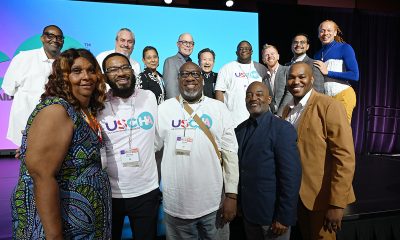
 National3 days ago
National3 days agoConcerns for future emerge at U.S. Conference on HIV/AIDS
-

 a&e features3 days ago
a&e features3 days agoCinePride Film Festival highlight: Filmmaker Alicia Coppola explores identity, memory, and trans representation in ‘And You Are?’
-
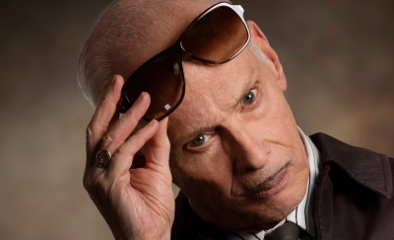
 a&e features15 hours ago
a&e features15 hours agoJohn Waters dishes on upcoming Unleashed LGBTQ+ appearance and connecting with new generations on the road
-

 a&e features2 days ago
a&e features2 days agoCinePride Film Festival highlight: Director Nate Gualtieri on his erotic trans short and Cate Blanchett’s executive producer credit






